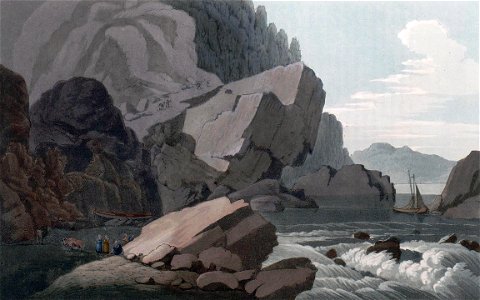No. Xxx. Road over a mountain near waller. Many of the roads over the mountains in norway chill the soul of a stranger in the most awful degree. Perhaps they are not to be equalled in any other part of the world; they are generally choked up with large fragments of rocks, loose stones, and broken trees. The descent from the mountains is generally most difficult, and frequently attended with the most imminent dangers. Disasters, however, seldom occur, owing to the wonderful caution and sagacity displayed by the norwegian horse, of which mention has already been made. Public travelling in norway is conducted on a plan highly injurious in a variety of respects to the most valuable part of the nation, the peasantry. In a moral view, it is productive of the most pernicious consequences, as will appear from the statement of the reverend andrew kirchhoff, rector of thunöe: he says: " the conveyance of travellers is almost invariably the first source of corruption among the peasantry, old as well as young, who find their bane in the post-houses. The peasant himself seldom attends his horse, which is to convey the traveller; he sends a servant boy, or more probably his own son, and at times his daughter. On arriving at the post-house the horse is tied to the wall, and frequently remains there for three or four hours. The person, who is to drive, grows wearied of waiting, and company not being wanted in such places, he embraces any opportunity of diversion. He flies to gaming and drinking, and in order to support the expense, becomes guilty of fraud, petty theft, and robbery. If, however, he has no opportunity of profiting by those means, he plays the tyrant with the poor horse, that he may get more drink-money from the traveller. Thus the post-houses form schools, in which youth contract habits that are seldom forgotten. "1
in regard to the pernicious effects produced on agriculture by the present mode of conducting public travelling, the sentiments of the rev. Mr. Kirchhoff are perfectly in unison with those of the rev. S. Hount, rector of berg, a most excellent and intrepid writer on norwegian subjects. He observes: "one of the most essential impediments to the advancement of agriculture in those parishes through which the great highways run, is undeniably to be found in the circumstance of the peasant being so very often called upon to convey travellers. He, thereby, not only loses a great deal of time, but his horses are worked to such a degree, that they become unfit for doing the labour required in agricultural pursuits that are to be conducted with vigour. Agriculture is, therefore, in a much worse state along the high roads, than in those tranquil parts of the country where the peasant is undisturbed, and able to devote the whole of his time to the cultivation of the ground, and the calm pursuits of domestic life. "2
the royal society for the welfare of norway has, in consequence, taken the proposals of messrs. Kirchhoff and hount into consideration, and it may be expected that a speedy and effectual substitute will be found for a custom pregnant with such fatal results. 1. ^ budstikken, an official paper, published by the royal society for the welfare of norway, and edited by l. Stoud platou, 1811, page 160. 2. ^ ibid. Page 165. Date: 1800. Road near Waller (JW Edy plate 30)
Loading...
